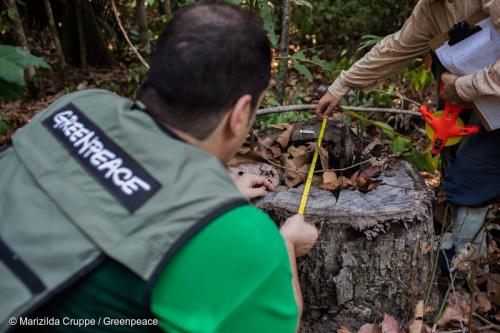Greenpeace investigation: EU imports of Amazon timber tainted by widespread fraud in Brazil
A Greenpeace investigation has exposed widespread fraud in the Brazilian forestry sector, which may have allowed massive quantities of illegal timber to reach the EU. Under the EU timber regulation, importers are obliged to take action to prevent illegal timber from entering the supply chain.

Much of this wood comes from Pará state in the Brazilian Amazon, which is one of the largest producers and exporters of tropical timber in Brazil, and where experts estimate that more than three-quarters of all logging is illegal. The investigation by Greenpeace Brazil, Imaginary trees, real destruction, reveals a system that allows the laundering of illegally harvested timber with legal paperwork.
Greenpeace EU forest policy director Sébastien Risso said:“Logging in the Brazilian Amazon is out of control. It’s practically impossible to guarantee that timber from the region comes from legal operations. National authorities in the EU should review the evidence and take urgent action to stop the sale of timber that does not meet the standards required by EU law. The European Commission should see that enforcement at national level is swift and effective”.
Loggers particularly target ipe trees, whose high value makes it profitable to penetrate deep into the Amazon rainforest, causing major environmental damage and an intensification of violence against local communities.
The Greenpeace investigation exposes fraudulent forest inventories. Inventories are required in the Brazilian licensing process for forest management plans. The documents frequently overestimate the volumes of valuable trees, misidentify undesirable trees as commercially valuable species, or simply list non-occurring specimens. Once forest management plans are approved, state agencies issue credits for the harvesting of this non-existent timber. These credits can then be used to cook the books of sawmills that process illegally logged trees from forests on indigenous lands, protected areas or public lands. Once laundered in this manner, illegal timber becomes indistinguishable from timber that has been harvested legally.
The investigation found that 11 EU countries imported 9,775.376 m³ of ipe timber from forest management plans with indications of fraud between March 2016 and September 2017. France imported the largest amount (3,002m³), followed by Portugal (1,862m³), Belgium (1,754m³) and the Netherlands (1,549m³).
Despite several earlier Greenpeace investigations exposing deficiencies in Brazil’s control system and the inadequacy of official documentation as a guarantee of the legal origin of Brazilian Amazon timber, many operators in Europe continue to import ipe wood from the region. It is unclear what kind of measures they are taking to mitigate the risks of illegality inherent in the timber. Companies in Europe should stop buying timber from the Brazilian Amazon unless they can provide credible independent evidence that the timber is legal, beyond the simple presentation of official documents.
Source: Greenpeace European Unit
- 337 reads
Human Rights
Fostering a More Humane World: The 28th Eurasian Economic Summi

Conscience, Hope, and Action: Keys to Global Peace and Sustainability

Ringing FOWPAL’s Peace Bell for the World:Nobel Peace Prize Laureates’ Visions and Actions

Protecting the World’s Cultural Diversity for a Sustainable Future

Puppet Show I International Friendship Day 2020

